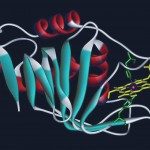Lien vers Pubmed [PMID] – 11133283
J. Magn. Reson. 2001 Jan;148(1):115-20
The effect of magic angle spinning (MAS) of liquids upon the performance of various isotropic mixing sequences is investigated. Although the mathematical formalism for isotropic mixing under MAS conditions is similar for both liquids and solids, the mechanism through which the coherence transfer is disturbed is different. In liquids, the use of sample spinning in the presence of both RF and magnetic-field inhomogeneities introduces a modulation of the effective field, which compromises the performance of the conventional mixing sequences. This effect is further amplified by supercycles, which normally improve the performance of the mixing and decoupling experiments. It is demonstrated that adiabatic mixing sequences are less susceptible to such modulations and perform considerably better in TOCSY MAS experiments. The best performance of TOCSY MAS is observed under the rotational resonance condition when the sample appears static in the nutation reference frame.

